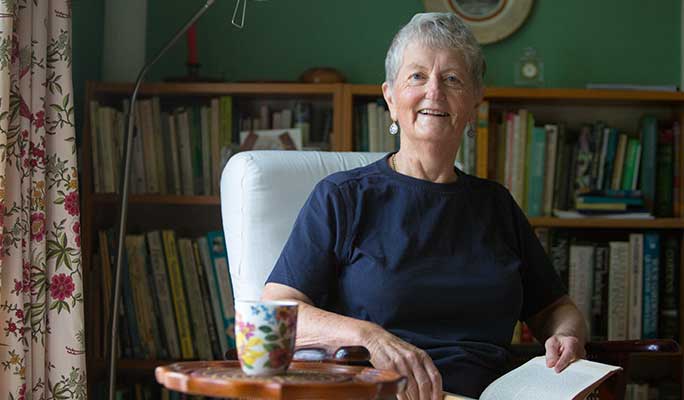It was a slight shaking in her hands that made 75-year-old Deryl first think she may have Parkinson’s disease. A neurologist soon confirmed her suspicions. “The symptoms were a bit irritating, but I just did my usual thing and tried to ignore it!” says Deryl.
Then Deryl’s symptoms started to interfere with the activities she loved doing, such as gardening, sewing, walking and giving lectures on horticulture. She was quickly referred to Royal Rehab Private Hospital’s multidisciplinary Parkinson’s Day Rehabilitation program.
Deryl began neurological physiotherapy based on the principles founded by the PD Warrior program, an internationally recognised program designed to improve the symptoms of Parkinson’s disease. This addressed the weakness and tremors in her hands. “My fine motor skills had deteriorated to the extent that I was finding those types of activities quite trying,” she says. “The therapist had me gripping things, squeezing things, using rubber bands and moving my hands in certain ways. I noticed an improvement in strength and control straight away.”
Joint stiffness had become another issue for Deryl and she had been walking awkwardly. “At Royal Rehab, I did a lot of walking and turning, some aqua aerobics and other full body movements to help my stiff joints. I was also finding my coordination wasn’t great so we practised engaging my brain when I was doing things so that I was making conscious movements. This actually helped a lot and is something I continue to do every day.”
“Deryl can now walk further, and her step length and cadence is significantly improved,” says Royal Rehab physiotherapist, Johnathan.
Deryl was also having some trouble with her speech, and this was hindering her participation in community activities and at work. “My voice would just go on me sometimes, or it might go husky or breathy – it was becoming difficult to control. It was hard to talk for long periods, which makes giving lectures a bit problematic.”
Vanessa, a Royal Rehab speech pathologist, focussed on helping Deryl improve her volume, control her pitch and articulate consonants more clearly. “We practised making a loud and sustained ‘ahhhh’ sound, consciously changing the pitch of her voice and reading frequently used words and phrases,” says Vanessa. “As well as improving control, the therapy changes the client’s pattern of behaviour. For example, they often don’t realise they are speaking softly. The therapy helps them be aware of it so they can recalibrate their volume.”
Deryl continues to practise her speech exercises in the car or the shower. “I am not overly troubled by my symptoms most of the time now. And if I do start to feel slightly off centre, I can do the exercises I learnt at rehab, and it very quickly improves my strength and control. The therapy showed me the importance of exercise and how much it helps my symptoms – I feel so energised afterwards. And I really didn’t mind doing the therapy at all. In fact, I enjoyed it! The therapists were very pleasant and helpful and worked at my pace. I would certainly do it again.”
“Deryl was a diligent client,” says Vanessa. “She put in a lot of effort. When clients do therapy every so often, and practise their exercises frequently in between times, they should largely be able to maintain their function. Without therapy, people with Parkinson’s find their function deteriorates. Unfortunately, some clients may have lost some cognition or insight into their condition which can make them apathetic. Then it’s our job to motivate them by making the therapy as functional as possible. We find out what is important to them, whether it is reading to their grandchildren or walking to the shops and focus on facilitating these skills to help bring back meaning and purpose to their lives.”


